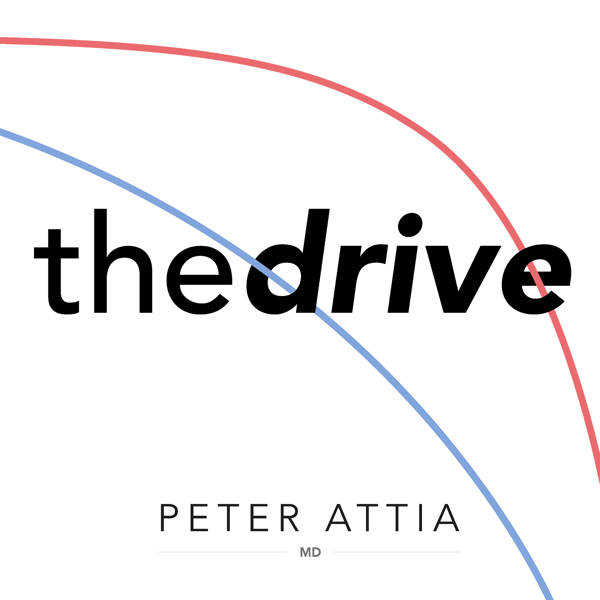#229 ‒ Understanding cardiovascular disease risk, cholesterol, and apoB
The Peter Attia Drive
Peter Attia, MD
4.7 • 7.3K Ratings
🗓️ 31 October 2022
⏱️ 79 minutes
🧾️ Download transcript
Summary
View the Show Notes Page for This Episode
Become a Member to Receive Exclusive Content
Sign Up to Receive Peter’s Weekly Newsletter
In this special episode of The Drive, we have pulled together a variety of clips from previous podcasts about cardiovascular disease to help listeners understand this topic more deeply, as well as to identify previous episodes which may be of interest. In this episode, Peter highlights the importance of understanding cardiovascular disease and why early intervention is critical. He also provides a primer on lipoproteins and explains the fallacy of the terms “good cholesterol” and “bad cholesterol.” Allan Sniderman discusses the metrics measured in routine blood work – along with the limitations of those standard panels – before explaining why apoB is a superior metric for determining risk. Additionally, Tom Dayspring explains the causal role of apoB in atherosclerotic cardiovascular disease (ASCVD) and the therapeutic goals for apoB concentration, and Peter explains how early and aggressive lowering of apoB could change the landscape of cardiovascular disease prevention.
We discuss:
- The importance of understanding atherosclerosis early in life [2:25]
- Defining ASCVD, its causes, and the role of cholesterol [8:00];
- Why early prevention of atherosclerosis is critical [13:45];
- Preventing atherosclerosis—two fatal flaws with the “10-Year Risk” approach [16:00];
- Intro to lipids and lipoproteins: why there is no “bad” or “good” cholesterol [23:00];
- Limitations of standard blood panels [35:45];
- How Mendelian randomization is bolstering the case for apoB as the superior metric for risk prediction [39:30];
- Therapeutic goals for apoB concentration [58:15];
- How early and aggressive lowering of apoB could change the course of ASCVD [1:10:45]; and
- More.
Connect With Peter on Twitter, Instagram, Facebook and YouTube
Transcript
Click on a timestamp to play from that location
| 0:00.0 | Hey everyone, welcome to the Drive Podcast. |
| 0:13.0 | I'm your host, Peter Atia. |
| 0:14.8 | This podcast, my website, and my weekly newsletter, I'll focus on the goal of translating |
| 0:18.7 | the science of longevity into something accessible for everyone. |
| 0:22.4 | Our goal is to provide the best content in health and wellness, full stop, and we've |
| 0:26.6 | assembled a great team of analysts to make this happen. |
| 0:29.4 | If you enjoy this podcast, we've created a membership program that brings you far more |
| 0:33.2 | in-depth content if you want to take your knowledge of the space to the next level. |
| 0:37.3 | At the end of this episode, I'll explain what those benefits are, or if you want to learn |
| 0:41.1 | more now, head over to peteratiamd.com forward slash subscribe. |
| 0:46.3 | Now, without further delay, here's today's episode. |
| 0:51.1 | Welcome to another special episode of the Drive. |
| 0:53.8 | As the podcast is now over four years old, we realize we've covered certain topics in a |
| 0:57.4 | variety of ways across multiple episodes. |
| 0:59.6 | We realize, of course, at times it can be hard to piece together this information, and |
| 1:03.5 | it's also difficult for new listeners to be able to go back and keep track of information |
| 1:07.9 | that's been covered in great depth in previous episodes. |
| 1:11.0 | As a result, we wanted to release another episode that is kind of a compilation of clips |
| 1:14.8 | from previous episodes. |
| 1:15.8 | We did this before, and it was a huge success. |
| 1:18.7 | So for this one, we want to focus on atherosclerotic cardiovascular disease, AACVD, cholesterol, |
| 1:24.3 | and APOB. |
... |
Please login to see the full transcript.
Disclaimer: The podcast and artwork embedded on this page are from Peter Attia, MD, and are the property of its owner and not affiliated with or endorsed by Tapesearch.
Generated transcripts are the property of Peter Attia, MD and are distributed freely under the Fair Use doctrine. Transcripts generated by Tapesearch are not guaranteed to be accurate.
Copyright © Tapesearch 2025.

